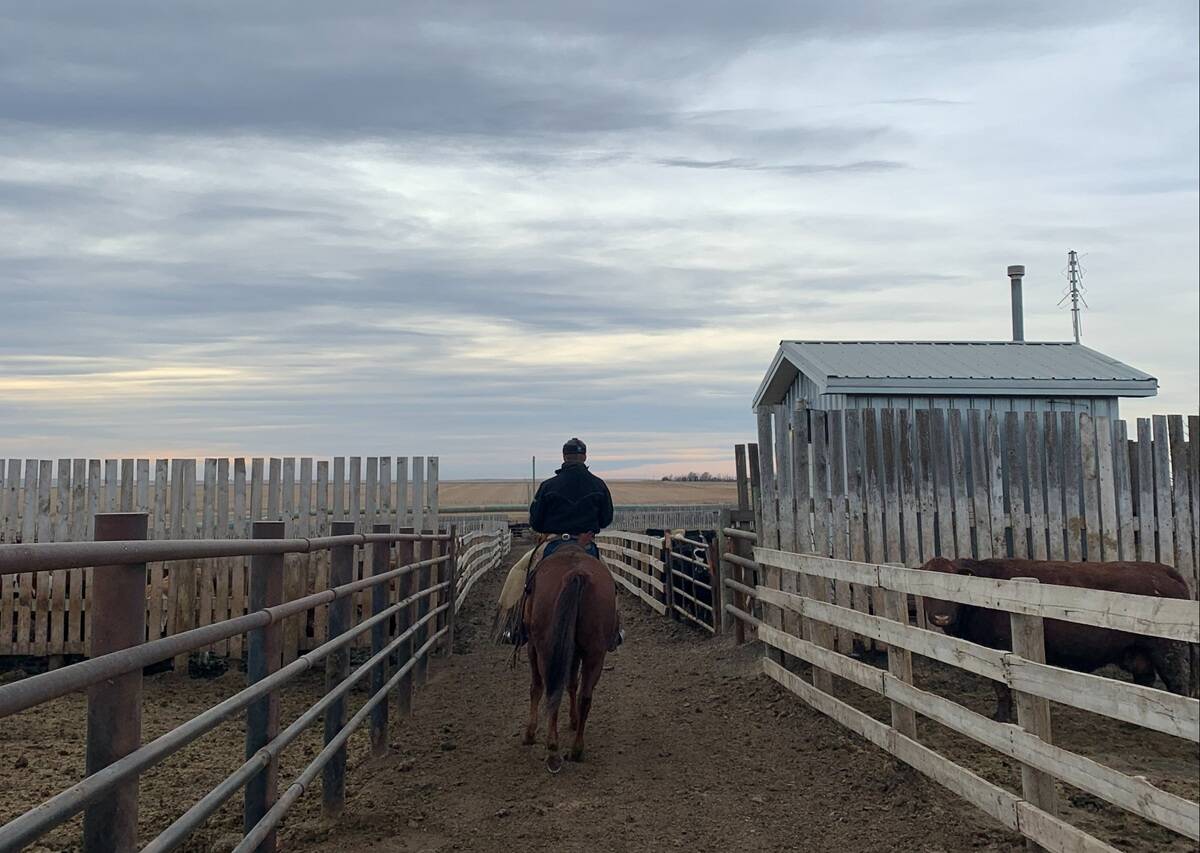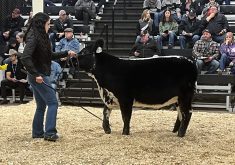Canadian beef cattle are known for being well-bred, good-looking animals. This has made Canadian purebreds and their genetics popular across the country, the continent and overseas.
While the market is strong, there’s room to grow and expand reach — especially internationally.
The Canadian Beef Breeds Council, the voice of the Canadian seed stock sector, is tasked with this job, and it prides itself on making sure it does it well.
Read Also

Pen riders still better than tech at detecting respiratory disease in feedlot cattle, says researcher
Recent research found that pen riders are better than tech at flagging signs of BRD in feedlot cattle
Communications and promotional materials include online communication campaigns, physical materials handed out at shows, global broadcasts of cattle shows and sales, and travel to international shows.
These marketing pieces are important to maintain current international interest in buying genetics from Canadian beef breeders and expanding it further. CBBC helps connect buyers with strong, quality genetics in Canada.
That’s made possible with funding from the federal government’s AgriMarketing program under the Sustainable Canadian Agricultural Partnership, which was reinvested last year. Over three years, CBBC will receive $871,200 from 2023-26.
Federal agriculture minister Lawrence MacAulay highlighted the funding during Canadian Western Agribition.
“This federal investment is vital for our hard-working farmers so they can continue raising first-rate cattle while embracing practices that protect our land and livestock,” he said.
Agribition is a partner of CBBC and plays a big part in the promotion of Canadian purebred beef cattle. This year’s show included six in-person purebred cattle sales and 10 breeds showcased. With this in mind, it’s no surprise that there is a lot of international trade that occurs at the show.
“Without promotion, without being able to go visit them and them come here, we wouldn’t have that trade,” said Sandy Russell, chief executive officer of CBBC.
“So, it’s those pieces, but it’s mainly in that high end of all genetics that they’re looking for so they can take back and amplify within their herd.”
Surrounded by the hum of the Agribition International Business Centre with the Simmental show going on in the arena below, Russell said that this funding goes toward all aspects of international promotion of Canadian genetics.
“To go out and bring inbound missions, outbound missions, so that we can build our trade exports on the genetic side,” she said.
“So live cattle, semen, embryos. And so, whether it’s through ourselves doing the work or our members doing the work, this funding is matching dollars that helps that promotion.”
AgriMarketing is ultimately about building relationships between potential buyers, sellers, breeders, and everyone else in the industry on the international level.
Russell said the funding is also important for sharing important and necessary information regarding genetics, Canadian animal health standards and opportunities for trade.
She said the council met with a Mexican delegation that had come to Agribition. Their discussion was focused on the interaction between the country’s beef industries and building those relationships. The Mexican delegation was interested in the discussion because it wants to take Canadian beef genetics home and improve the country’s cattle herds.
International growth
In recent years, in part because of funding from the AgriMarketing program, international attendance at shows such as Agribition has increased and interest in Canadian beef genetics have grown.
Russell said the United States is the number one marketing partner due to its proximity, but strategic markets that offer diversity and growth also include Vietnam, Australia, Mexico, Brazil and Argentina.
CBBC attends shows in North America and around the world such as Agribition, Farm Fair in Edmonton, Beef Australia, National Western Stock Show in Denver and some in Mexico.
“So, a lot of it is travel, but a lot of it is also promotional materials, activities, virtual broadcasts of shows and stuff, so that people can view what was going on here and participate, like I said, in sales and stuff.”
Russell said CBBC has a prominent partnership with Australia. There are a few Australians at Agribition, notably the chief executive officer of Beef Australia, the biggest beef show on the other side of the world.
“We send representatives over to their big cattle show, they come here,” she said.
“That would be a prime example of an activity that we’ve been doing and supported by these funding dollars that really translated into relationships, attendance, coming to each other’s country, seeing the cattle, seeing the opportunities, and then business being done.”
Russell said this commitment to partnerships is reflected by the willingness of Australian and Mexican buyers to travel to Regina at the end of November when the risk of a foot of snow on the ground is high.
However, Russell said it’s not just up to organizations such as CBBC to do this promotion and speak to buyers. It’s also up to producers.
“Breeders connecting with breeders is really what is ideal for relationships and for marketing,” she said.
“The Mexican breeders that are here, they don’t want to talk to Sandy, they want to go out into the barns and talk to the actual breeders.”
Russell urged producers to take advantage of the opportunities at shows and the resources that CBBC has to better engage in the international marketplace.
“We can help support them inside those activities and participate in the missions, she said.
“Whether that’s incoming breeders from other countries or outgoing to other countries, that opportunity to learn and to see what other countries need, from a genetics perspective, is extremely valuable.”

















